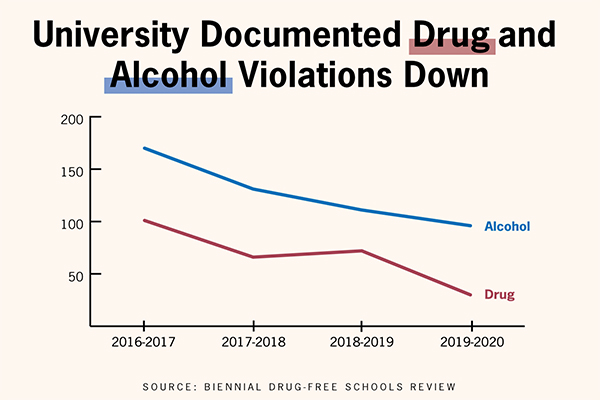Drug violations recorded by the University have decreased by about 58% since last year, and alcohol violations have decreased by about 14%, according to the Drug-Free Schools and Communities Act Biennial Review.
Robert Leary, assistant director for student conduct and academic integrity in the Office of the Dean of Students, said violations happen when the UT Police Department finds a student severely under the influence or someone reports a student for drug and alcohol concerns to the Office of the Dean of Students. Sanctions can range from counseling to suspension, according to the review.
During the last school year, the University recorded 96 alcohol violations, down from the 111 reported for the 2018-19 academic year and the 131 reported for 2017-18, according to the review. Thirty drug violations occurred last year, dropping from 72 reported in 2018-19 and the 66 reported in 2017-18, according to the review.
Leary said last semester, students reported to the Office of the Dean of Students for drug violations would receive a deferred suspension or suspension as the minimum consequence for the offense. Now, the University will not automatically suspend students for drug violations, he said.
“The rules now don’t have that kind of minimum sanctioning for drug violations,” Leary said. “Our office, as we get them, we’ll definitely be evaluating what are the fair and equitable sanctions for those two, especially given that there’s not a minimum in the rules.”
Audrey Sorrells, associate dean of students for research in the Office of the Dean of Students, said the prevention programming at UT is helping to reduce the number of University-recorded drug and alcohol violations.
“Just overall, you should see that students are in much better positions to be able to address needs and concerns related to alcohol and drug use and misuse,” Sorrells said.
One of the review’s recommendations was to create a task force to oversee the implementation and assessment of all of the University’s alcohol and other drugs programming, Sorrells said.
“(The task force) would help centralize data and align efforts while also maintaining accountability,” Sorrells said.
Sorrells said the review also recommended that the University clearly define what they deem to be effective at combating alcohol and drug violations.
Kate Lower is the director of SHIFT, a University program dedicated to changing the idea that alcohol and drug use is an inevitable part of college. Lower said SHIFT launched six different pilot programs to help raise awareness of drug and alcohol use.
One of the pilot programs focuses on training faculty members to help introduce conversations about alcohol and drug use in the classroom.
“There’s (a) professor that teaches something about Russian czars and leaders, and they naturally talked about the role of vodka in that culture or the role of alcohol to suppress riots or suppress activism in that culture,” Lower said. “It doesn’t seem like that might be a direct connection that’s talking about college culture or substance use or misuse culture, but it lent itself to talking about … the culture in which we are engaged.”
Lower said she is looking to recruit more faculty into the SHIFT faculty pilot program and see any impacts on student culture around drug and alcohol use.
“(We’re hoping) that we’ll start to see shifted conversations that students know their resources, more specifically how to navigate them,” Lower said.





















